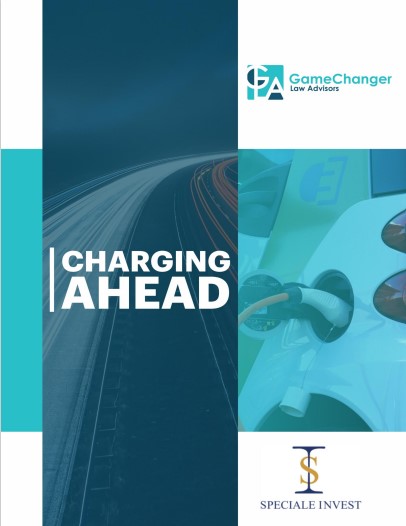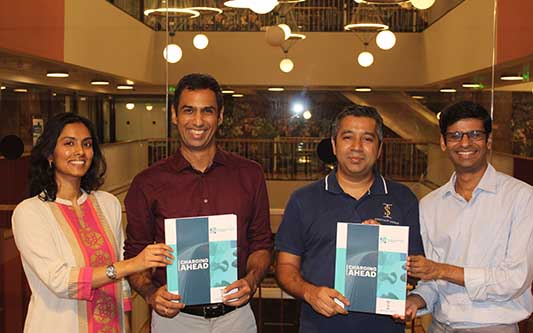- Cross-jurisdictional, regulatory and in-depth industry analysis of regulations and impact
- potential to strengthen the industry’s sustainable innovation commitment and provides a much-needed larger context for the Indian EV landscape
- The Report contains suggestions for Indian policymakers addressing industry, investor and legal concerns based on EU, UK and California regulations.
Bangalore – GameChanger Law Advisors, a reputed Bengaluru-based corporate and commercial law firm, and Speciale Invest, a leading seed-stage venture capital firm,havejointlyreleased a first-of-its-kind report containing a cross-jurisdictional, regulatory and industry analysis of electric vehicle battery packs. The “Charging Ahead” reporthighlights the regulatory landscape for EV Battery Packs in India.
Charging Aheadpoints to huge potential for India in manufacturing EV battery packs as the country is heavily dependent on importing 60-65% of the total component requirement for battery packs.

As the Report highlights, the Indian EV battery market size is also expected to grow from USD 16.77 billion in 2023 to USD 27.70 billion by 2028, at a CAGR of 10.56% between 2023 and 2028, indicating that India’s EV battery industry landscape is at the cusp of a remarkable expansion.
“This Report is an outcome of a unique collaboration between lawyers, investors, and electric mobility industry operators. In this report, we have examined the current legal landscape for EV battery packs in India and provided a comparative reference point for Indian policymakers by drawing their attention to regulations in California, the European Union, and the United Kingdom,” said Amrut Joshi, Founder, GameChanger Law Advisors (GLA). GLA regularly represents several clients in the electric mobility industry and investors who have invested in various EV startups.
In a rapidly evolving world towards sustainable and environmentally conscious solutions, the electric vehicle (EV) industry has emerged as a formidable force, promising a cleaner, greener future. At the heart of this global shift stands India, the fastest-growing economy in the world with immense potential to lead the electric mobility revolution. As a result, the demand for electric battery packs has increased substantially. Speciale Invest’s investments in companies like Ultraviolette, the ePlane company, and eTRNL have provided invaluable insights into the intricacies of the Indian electric vehicle and battery pack markets.
“As we embark on this journey with GameChanger Law Advisors, ‘Charging Ahead’ aims to empower founders, investors, and policymakers alike with the knowledge and guidance needed to accelerate India’s transition towards a sustainable, electric future,” says Vishesh Rajaram, Managing Partner, Speciale Invest.
While a majority of EV Original Equipment Manufacturers (OEMs) have developed battery pack assembly facilities in-house by using imported lithium-ion cells or purchasing imported battery packs, VC-funded start-ups such as Ather, Ola Electric, Cosbike, and Pure EV continue to supply their battery packs to most two and three-wheeler OEMs, and this is a reflection of recent market trends.
Current Indian EV Market Trends
The Indian EV market was valued at $.3.21 billion in 2022, and is expected to grow to $113.99 billion by 2029 at a compound annual growth rate of 66.52%. In 2022, 25% of EVs sold in India were purchased by fleet operators, including for taxis. In recent years, EV sales in India have significantly increased because it is a cleaner and more efficient alternative to gasoline-powered vehicles. With the growth of sales of EVs in India, the Indian government has set a target to achieve 30% electrification of India’s vehicle fleet by 2030.
The Economic Survey 2023 predicts that India’s domestic EV market will witness a 49% compound annual growth rate between 2022 and 2030, and the number of EV units sold annually will touch 10 million by 2030.
Key Suggestions for Indian Policy Makers:
The Report outlines a set of suggestions for Indian policymakers on a host of concepts, including but not limited to Carbon Footprint Declaration (CFD), Battery Swapping Policy, Battery Passport, Second-Life Battery Policy and Safety Standards for Second-Life Batteries. Interestingly, the Report describes the Guidelines for Battery Safety Tests issued by the Ministry of Heavy Industries in November 2022 to enhance human safety and maps it with safety regulations prescribed in other jurisdictions.












